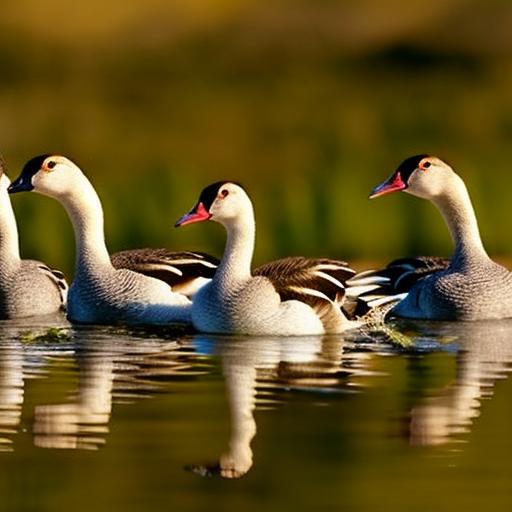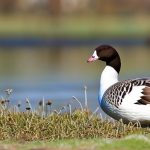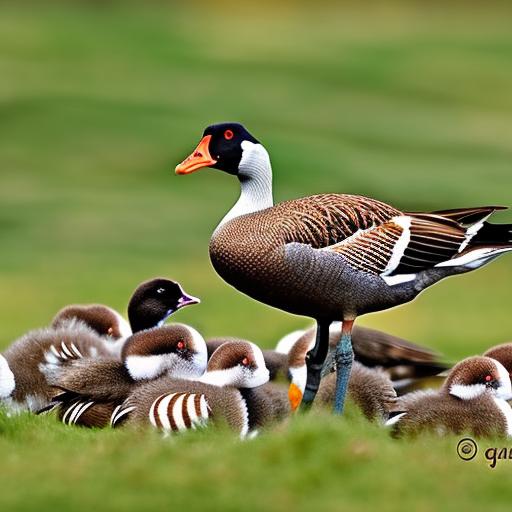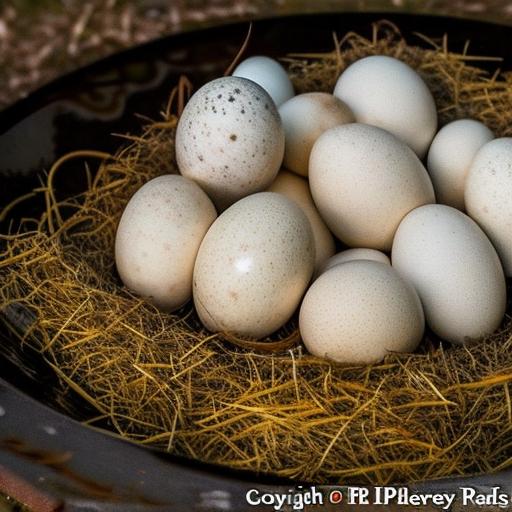Geese breeding is the process of raising geese for various purposes, such as meat production, egg production, or simply as pets. Geese are known for their hardiness and adaptability, making them an ideal choice for small-scale farming or backyard breeding. They are also known for their excellent parenting skills and can be raised to produce both meat and eggs.
There are several benefits to raising geese. Firstly, geese are efficient grazers and can help control weeds and pests in your garden or pasture. They also produce high-quality meat and eggs, which can be a valuable source of income. Additionally, geese are relatively low-maintenance animals and require minimal inputs compared to other livestock.
To successfully breed geese, there are a few basic requirements that need to be met. Firstly, geese require ample space to roam and graze. They should have access to a pond or water source for swimming and bathing. Geese also need shelter to protect them from extreme weather conditions and predators. Finally, geese require a balanced diet consisting of grass, grains, and supplemental feed.
Key Takeaways
- Geese breeding requires careful selection of breeding stock, proper preparation, and management of the flock.
- There are different breeds of geese, each with unique characteristics and suitability for specific purposes.
- Selecting the right breeding stock involves considering factors such as breed, age, health, and genetic traits.
- Proper preparation of geese for breeding involves providing adequate nutrition, housing, and environmental conditions.
- Successful incubation of geese eggs requires proper temperature, humidity, and turning of the eggs.
Understanding the Different Breeds of Geese
There are several popular breeds of geese that are commonly bred for various purposes. Each breed has its own unique characteristics and qualities that make it suitable for different needs.
One popular breed is the Toulouse goose, which is known for its large size and excellent meat quality. Toulouse geese have a calm temperament and are easy to handle, making them a popular choice for backyard breeders.
Another popular breed is the Embden goose, which is known for its white plumage and large size. Embden geese are also good meat producers and have a calm temperament.
The Chinese goose is another common breed that is known for its distinctive knob on its bill. Chinese geese are good egg producers and are often used for crossbreeding to improve egg production in other breeds.
When choosing the right breed for your needs, it is important to consider factors such as the purpose of breeding, available space, and climate conditions. Some breeds may be better suited for meat production, while others may excel in egg production. It is also important to consider the temperament and behavior of the breed, as some geese may be more aggressive or territorial than others.
Selecting the Right Breeding Stock for Successful Geese Breeding
Selecting healthy breeding stock is crucial for successful geese breeding. Healthy breeding stock will produce healthy offspring and ensure the overall success of your breeding program.
When selecting breeding stock, there are several factors to consider. Firstly, look for geese that are in good physical condition. They should have bright eyes, clean feathers, and a healthy appetite. Avoid geese that show signs of illness or have any physical deformities.
It is also important to consider the age of the geese. Younger geese are generally more fertile and have a longer breeding lifespan. However, older geese may have more experience and be better parents.
Another factor to consider is the genetic diversity of your breeding stock. Inbreeding can lead to genetic defects and reduced fertility. It is recommended to introduce new bloodlines into your flock periodically to maintain genetic diversity.
When choosing the best breeding stock, it is also important to consider the temperament and behavior of the geese. Look for geese that are calm and docile, as aggressive or territorial geese may pose a risk to other birds or humans.
Preparing Your Geese for Breeding: Tips and Techniques
Preparing your geese for breeding is essential to ensure successful reproduction and healthy offspring. There are several steps you can take to prepare your geese for breeding.
Firstly, provide your geese with a balanced diet that includes a mix of grass, grains, and supplemental feed. A well-nourished goose is more likely to have successful breeding and produce healthy offspring.
Creating a suitable breeding environment is also important. Geese require a quiet and secluded area to nest and lay their eggs. Provide nesting boxes or shelters where the geese can lay their eggs in peace.
To encourage successful breeding, it is important to ensure that the geese are in good physical condition. Regularly check their health and provide any necessary vaccinations or treatments. It is also important to provide ample space for the geese to roam and exercise, as this can improve their overall health and fertility.
The Art of Incubation: Hatching Geese Eggs
Incubation is the process of artificially hatching geese eggs. This can be done using an incubator or by allowing the geese to sit on the eggs themselves.
To successfully incubate geese eggs, it is important to maintain the right temperature and humidity levels. The ideal temperature for incubating geese eggs is around 99-100 degrees Fahrenheit (37-38 degrees Celsius). The humidity level should be around 50-55%.
It is important to regularly turn the eggs during incubation to prevent the embryos from sticking to the shell. This can be done by hand or using an automatic egg turner.
During incubation, it is important to monitor the development of the embryos. Candling the eggs can help you determine if they are developing properly. Remove any eggs that are not developing or show signs of contamination.
Common problems during incubation include low fertility, poor hatchability, and deformities in the goslings. To avoid these problems, it is important to select healthy breeding stock and provide them with proper nutrition and care.
Raising Goslings: Caring for Your Young Geese

Caring for goslings after hatching is crucial for their survival and growth. Goslings are delicate and require special care during their early stages of life.
After hatching, goslings should be kept in a warm and dry environment. Provide them with a brooder box or pen that is heated to around 90-95 degrees Fahrenheit (32-35 degrees Celsius). Gradually reduce the temperature over time as the goslings grow.
Goslings should be fed a balanced diet that is high in protein. Commercially available chick starter feed or a mix of grains and legumes can be used. Provide fresh water at all times and ensure that the goslings have access to it.
It is important to monitor the health of the goslings closely. Look for signs of illness or distress, such as lethargy, loss of appetite, or abnormal droppings. Seek veterinary care if necessary.
Managing Your Geese Flock: Feeding, Housing, and Health Considerations
Managing your geese flock involves providing them with proper feeding, housing, and healthcare. Geese have specific requirements that need to be met to ensure their well-being.
Geese require a balanced diet that includes grass, grains, and supplemental feed. They are efficient grazers and should have access to fresh pasture or grazing areas. Supplement their diet with grains or commercial feed to ensure they receive all the necessary nutrients.
When it comes to housing, geese require shelter to protect them from extreme weather conditions and predators. Provide them with a secure and spacious shelter that is well-ventilated. The shelter should also have nesting boxes or areas where the geese can lay their eggs.
Regularly monitor the health of your geese flock and provide any necessary vaccinations or treatments. Common health issues in geese include respiratory infections, parasites, and foot problems. Seek veterinary care if you notice any signs of illness or distress.
Breeding Geese for Meat Production: Best Practices and Considerations
Breeding geese for meat production can be a profitable venture. Geese are known for their high-quality meat, which is lean and flavorful.
To breed geese for meat production, it is important to select breeds that are known for their meat quality, such as the Toulouse or Embden geese. These breeds have large body sizes and produce tender and flavorful meat.
Provide your geese with a balanced diet that includes grass, grains, and supplemental feed. This will ensure that they grow at a healthy rate and produce high-quality meat.
Regularly monitor the weight and growth of your geese to ensure that they are reaching the desired market weight. Harvest the geese at the appropriate age to ensure optimal meat quality.
Breeding Geese for Egg Production: Maximizing Your Yield
Breeding geese for egg production can be a lucrative business. Geese are known for their excellent egg-laying abilities and can produce a large number of eggs each year.
To breed geese for egg production, it is important to select breeds that are known for their egg-laying abilities, such as the Chinese or African geese. These breeds have a high egg production rate and can lay up to 50-60 eggs per year.
Provide your geese with a balanced diet that includes grass, grains, and supplemental feed. This will ensure that they receive all the necessary nutrients to produce high-quality eggs.
Regularly collect the eggs from the nesting boxes to prevent them from getting dirty or damaged. Store the eggs in a cool and dry place until they are ready to be incubated or sold.
The Business of Geese Breeding: Opportunities and Challenges
The geese breeding industry offers several opportunities for breeders. Geese products, such as meat and eggs, are in high demand and can be sold at premium prices. Additionally, there is a growing market for live geese as pets or for ornamental purposes.
However, there are also several challenges that breeders may face. Geese require ample space and resources, which can be a limiting factor for small-scale breeders. Additionally, geese can be prone to certain health issues, such as respiratory infections or foot problems, which can affect their productivity.
To overcome these challenges, it is important to have a well-planned breeding program and to provide proper care and management to your geese flock. Regularly monitor the health and well-being of your geese and seek veterinary care if necessary. Additionally, market your geese products effectively to reach potential customers and maximize your profits.
If you’re interested in geese breeding, you may also want to check out this informative article on poultrywizard.com about building a snaplock chicken coop. A well-designed coop is essential for providing a safe and comfortable environment for your geese to breed and thrive. This article provides valuable insights and tips on constructing a sturdy and secure coop that will meet the specific needs of your geese. To learn more, click here: https://poultrywizard.com/keeping-chickens/snaplock-chicken-coop/.
FAQs
What is geese breeding?
Geese breeding is the process of raising geese for the purpose of producing offspring.
What are the benefits of geese breeding?
Geese breeding can provide a source of meat, eggs, and feathers. It can also be a profitable business venture.
What are the different breeds of geese?
There are many different breeds of geese, including Toulouse, Embden, African, Chinese, and Canadian.
What is the best time of year to breed geese?
The best time of year to breed geese is typically in the spring, when the weather is warmer and there is more daylight.
What is the incubation period for goose eggs?
The incubation period for goose eggs is typically around 28-30 days.
What is the best way to care for geese during the breeding process?
Geese should be provided with a clean and safe environment, plenty of food and water, and regular veterinary care. It is also important to monitor their behavior and health closely during the breeding process.
What are some common health issues that can affect geese during breeding?
Common health issues that can affect geese during breeding include respiratory infections, egg binding, and parasites. Regular veterinary care and proper hygiene can help prevent these issues.
Meet Walter, the feathered-friend fanatic of Florida! Nestled in the sunshine state, Walter struts through life with his feathered companions, clucking his way to happiness. With a coop that’s fancier than a five-star hotel, he’s the Don Juan of the chicken world. When he’s not teaching his hens to do the cha-cha, you’ll find him in a heated debate with his prized rooster, Sir Clucks-a-Lot. Walter’s poultry passion is no yolk; he’s the sunny-side-up guy you never knew you needed in your flock of friends!







